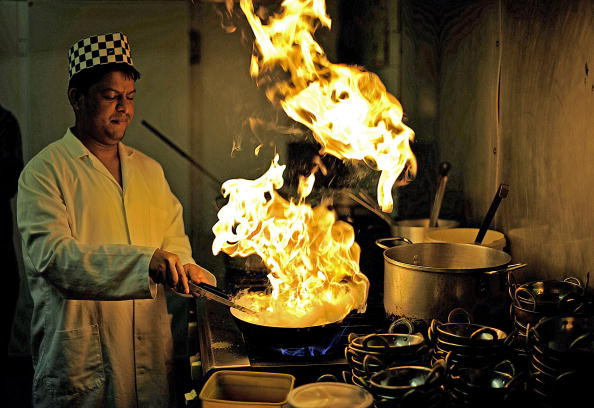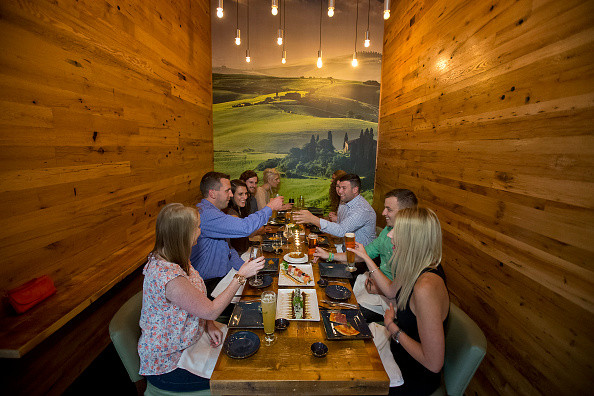Karan Bilimoria: We have a taste for world food – but do we have the skills to support it?
When it comes to food, Britain is a cultural and culinary crucible for influences from around the world.
One of Britain's most venerable spots is the site on George Street in London where the Hindoostane Coffee House – Britain's first recorded Indian restaurant – was opened in 1810 by Indian-born immigrant Sake Dean Mahomed.

Mahomed was also the founder of a very successful massage bath in Brighton, where customers could receive the medical benefits of so-called "shampoo"' for the first time. The entrepreneurial ventures he brought from India made him one of British society's most unique and successful people of the time.
Even today, his legacy endures. Two centuries after Mahomed set up his restaurant, curry is one of Britain's favourite dishes.
The Asian restaurant sector is now a major industry with its own macroeconomic climate. And this move to Eastern tastes has come about as a result of Britain bringing in chefs from around the world.
Behind every development in tastes is a larger undercurrent, the movement of people across the world bringing with them the knowledge, skills and ingredients to put interesting dishes on the table.
It seems Britain's taste for good food is hard to satiate. One of the strongest indicators of recovering prosperity in the UK is the increase in dining out, which we need to sustain by allowing the nation to bring in the right culinary skills and the talented chefs who can share their experiences to benefit the industry as a whole.
Previously, recession-hit purses across the nation meant consumers had largely turned to supermarkets and discounters for thrifty home-cooking solutions and microwave meals. Restaurants therefore hugely welcome the increase in the number of people dining out.
Spending on the rise when it comes to food and drink
As consumers find their real incomes increasing, they are spending more on food and drink. The highest growth in expenditure benefits the hotels, restaurants and bars as Visa Europe estimates Britons spent over 10% more in the hospitality sector in May 2015, compared with the same period in 2014.
At the rising crest of an economic recovery, the hospitality industry will begin to see an estimated 14.8% growth between 2014 and 2018, according to business intelligence provider Key Note.
This growth is also good news for the food-manufacturing sector, which relies on hefty appetites in bars, restaurants and food outlets and, in turn, creates jobs and supports a balanced economy.
The food and drink sector is the largest subsector within British manufacturing, and must work hard to create close ties with the businesses they supply.
Fostering relationships between industries can lead to profitable and mutually beneficial business results. When Cobra Beer launched 25 years ago, our early adopters were the ethnic restaurants. By nurturing this relationship, it is today stocked in over 98% of South Asian restaurants around the UK and we reciprocate their support in any way we can.
As the dining industry expands, more diverse ethnic tastes will reach the market and entrepreneurs of all backgrounds will be given the chance to sell new products. This will be a fantastic boost to UK food and drink, which we could export all over the world.
Behind all great tastes are great craftsmen. Britain's long-standing heritage in the culinary field owes a lot to its craftsmen, but now a skills shortage threatens to stunt the growth of the restaurant industry.
According to the UK Commission for Employment and Skills, 20% of vacancies in the hospitality sector are for skilled jobs; this figure rises to 44% for skilled chefs. Clearly the demand for great food is creating enormous pressure in the industry.

Critically, British restaurant businesses – particularly curry houses – cannot afford to pay the high wages they will need to in order to justify employing chefs from abroad under rules proposed by the UK government, precipitating a grave shortage of skills in the UK's restaurant industry.
And yet, this is the same industry that owes so much to the enterprising efforts of immigrants centuries ago.
However, Britain's Asian restaurants are making the best of the skills that already exist in the sector. We have recently launched a national campaign with the support of a group of award-winning Indian chefs, including Alfred Prasad (formerly Tamarind), Vivek Singh (The Cinnamon Club & Cinnamon Kitchen), Cyrus Todiwala OBE DL (Café Spice Namaste), Mehernosh Mody (La Porte des Indes), Vineet Bhatia (Vineet Rosi) and Atul Kochhar (Benares).
They are embarking on a mission to share their invaluable knowledge and expertise with hundreds of chefs around the country, focusing on core skills including understanding ingredients and suppliers; the fundamentals of cooking; menu planning, kitchen organisation; and communication within the restaurant.
Like so many of Britain's top chefs, they were born in India, and their work testifies to the value that creative talent from abroad contributes to British business.
Most of all, their efforts underline the fact that Britain's dining industry – a strong attraction for tourists, overseas talent and the life support for the most innovative entrepreneurs in Britain's largest manufacturing subsector – relies on great craftsmanship, drawing on inspiration, knowledge and talent from those parts of the world that have done the most to influence our tastes.
© Copyright IBTimes 2025. All rights reserved.






















